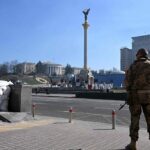
The Biden administration announced additional sanctions on Thursday on the Russian State Duma and a number of oligarchs, ratcheting up its economic retaliation against the Kremlin for its unprovoked war on Ukraine.
This latest tranche of sanctions targets 328 members of the State Duma — Russia’s chief legislative body — by name as well as the Duma as a whole. Several financial institutions and their leaders are also included.
“We will continue to impose costs until Putin ends this unprovoked war against Ukraine,” Secretary of State Antony Blinken said in a statement. “We call on those closest to Putin to cease and publicly condemn this cold-blooded war, which has caused the unconscionable death of hundreds of civilians, including children, and the largest humanitarian catastrophe in Europe since the Second World War.”
Sanctions on the Duma stemmed from its use of legislative power to “to target domestic dissenters and political opponents, disrupt the free flow of information, and restrict the human rights and fundamental freedoms of the citizens of Russia,” Blinken said.
All property and interests in property owned by Herman Gref, Russia’s former Minister of Economics and Trade, are now blocked in the U.S. Gref is the current CEO of Sberbank, a state-owned bank and one of Russia’s largest employers, according to its website.
Two other financial institutions — PJSC Sovcombank and OOO Volga Group — also face sanctions, as do their executives and their family members. The owner of OOO Volga Group, Gennady Nikolayevich Timchenko, is among those sanctioned.
Blinken also announced additional “severe costs” on Russia’s defense sector, targeting the companies that produce weapons for Russia’s military.
“With our partners and allies, the United States aims to strike the heart of Russia’s ability to engage in warfare and carry out aggression against other countries, including Ukraine,” Blinken said. “We will continue to impose costs until Putin ends this unprovoked war against Ukraine.”
Last week, Blinken said U.S. sanctions against Russia are “not designed to be permanent” and could “go away” should Russia commit to an “irreversible” withdrawal from Ukraine.




